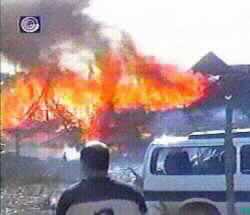Kenya Probe Focuses on Somali Militants
30/11/2002| IslamWeb
 United States officials say they believe a Somali-based Islamic group may have carried out Thursday's twin attacks on Israeli targets in the Kenyan city of Mombasa. The officials say the group, Al-Ittihad al-Islamiya (AIAI), also known as the Islamic Union, is a prominent militant organisation in the Horn of Africa with links to Osama Bin Laden's al-Qaeda network. AIAI has around 2,000 members and is thought to be behind a series of bomb attacks in Ethiopia in the late 1990s, according to the US State Department's Patterns of Global Terrorism report.
United States officials say they believe a Somali-based Islamic group may have carried out Thursday's twin attacks on Israeli targets in the Kenyan city of Mombasa. The officials say the group, Al-Ittihad al-Islamiya (AIAI), also known as the Islamic Union, is a prominent militant organisation in the Horn of Africa with links to Osama Bin Laden's al-Qaeda network. AIAI has around 2,000 members and is thought to be behind a series of bomb attacks in Ethiopia in the late 1990s, according to the US State Department's Patterns of Global Terrorism report.
Washington is still investigating whether al-Qaeda was directly involved in the attacks, as Kenyan and Israeli officials have been speculating.
Twelve people are being held for questioning by Kenyan police, including six Pakistanis, three Somalis, an American and a Spaniard.
However, the US Government said the American woman arrested by the Kenyans and her Spanish husband were "innocent backpackers" and should be released soon.
Three suicide bombers killed themselves and 13 people in the Paradise Hotel. The dead included three Israeli tourists but were mostly Kenyans.
There was an almost simultaneous attempt to shoot down an Israeli airliner
US and Israeli security officers have joined the hunt for those responsible for attacks, with investigators sifting through the rubble of the Israeli-owned Paradise Hotel.
And the US and several other Western countries have increased security at embassies and issued warnings to citizens travelling to Kenya.
Troublesome border
A previously unknown group called the Army of Palestine earlier claimed responsibility for the attacks.
But US officials are focusing attention on AIAI because of its suspected al-Qaeda links and presence in Kenya.
It is thought to be behind bomb attacks in the Ethiopian capital Addis Ababa in 1996 and 1997 and the kidnapping of relief workers in 1998.
Kenya has a long remote border with Somalia which is particularly difficult to police because of incursions by armed bands known as shiftas.
Ten years of conflict and instability in Somalia have made weapons easily available in border areas.
Warnings
Kenyan President Daniel arap Moi, visiting the bombed hotel, said the attacks showed terrorism was dangerous not only to Europe and the United States, but also to Africa.
But his Vice-President, Musalia Mudavadi, expressed dismay that the country had become a battleground for other people's wars.
The Kenyan authorities have pledged to spare no effort in tracking down the attackers.
Australia, whose citizens were targeted in the Bali bombing last month, warned two weeks ago of an increased terrorist threat in Mombasa and Nairobi, and told its citizens to avoid non-essential travel.
PHOTO CAPTION
A man observes the blaze outside the Paradise Hotel in Kikambala, Kenya, in this amateur video image showing the immediate aftermath of Thursday's bomb attack, made available on Friday, Nov. 29, 2002. (AP Photo/APTN/IBA)
- Nov 29 9:
www.islamweb.net
